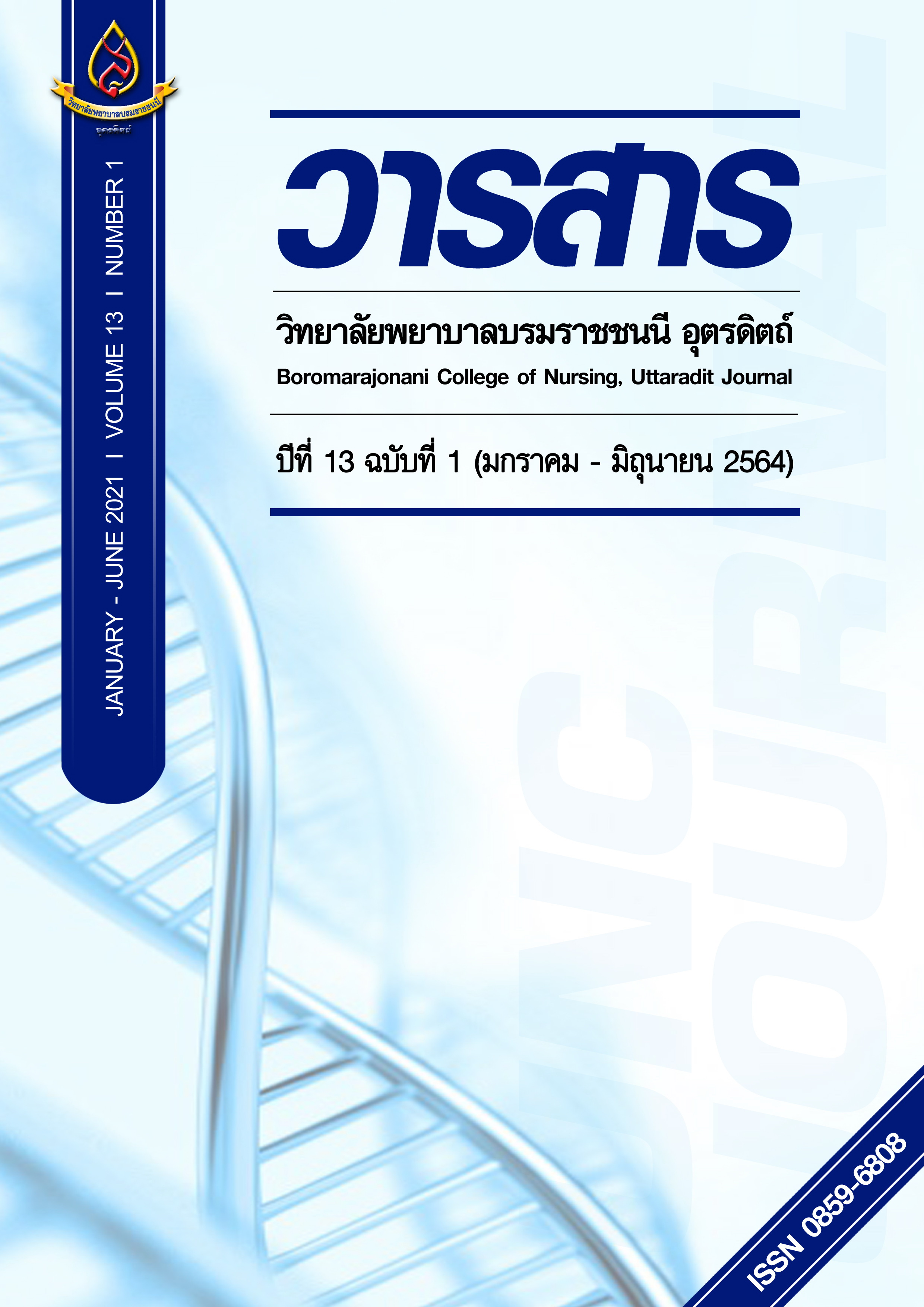ผลของการบำบัดทางความคิดและพฤติกรรมอย่างย่อโดยครอบครัวมีส่วนร่วม ต่อการเสพแอมเฟตามีนของวัยรุ่นเสพติดแอมเฟตามีนระยะฟื้นฟู
Main Article Content
บทคัดย่อ
การวิจัยกึ่งทดลองครั้งนี้ มีวัตถุประสงค์เพื่อเปรียบเทียบการเสพแอมเฟตามีนของวัยรุ่นเสพติดแอมเฟตามีนระยะฟื้นฟูในรายสมัครใจบำบัดก่อนและหลังเข้าร่วมการบำบัดทางความคิดและพฤติกรรมอย่างย่อโดยครอบครัวมีส่วนร่วม และเปรียบเทียบการเสพแอมเฟตามีนของวัยรุ่นเสพติดแอมเฟตามีนที่เข้าร่วมการบำบัดทางความคิดและพฤติกรรมอย่างย่อโดยครอบครัวมีส่วนร่วมกับกลุ่มที่ได้รับการพยาบาลตามปกติ กลุ่มตัวอย่างคือ วัยรุ่นเสพติดแอมเฟตามีนและพ่อหรือแม่ จำนวน 40 คู่ แบ่งเป็น 2 กลุ่ม คือ กลุ่มทดลอง 20 คู่ และกลุ่มควบคุม 20 คู่ โดยคัดเลือกกลุ่มตัวอย่างที่มีคุณสมบัติตามเกณฑ์ เครื่องมือวิจัย ได้แก่ 1) การบำบัดทางความคิดและพฤติกรรมอย่างย่อโดยครอบครัวมีส่วนร่วมที่ผู้วิจัยสร้างขึ้น 2) แบบวัดการเสพแอมเฟตามีน เครื่องมือทั้ง 2 ชุดผ่านการตรวจสอบความตรงตามเนื้อหาจากผู้ทรงคุณวุฒิ จำนวน 5 คน เครื่องมือชุดที่2 มีค่าสัมประสิทธิ์อัลฟาของครอนบาคเท่ากับ .90 วิเคราะห์ข้อมูลโดยใช้ค่าเฉลี่ย ส่วนเบี่ยงเบนมาตรฐานและใช้สถิติทดสอบที (t-test dependent) เพื่อเปรียบเทียบคะแนนการเสพแอมเฟตามีน (TLFB) ของกลุ่มทดลองก่อนและหลังให้โปรแกรม และสถิติทดสอบที (t-test independent) เพื่อเปรียบเทียบคะแนนการเสพแอมเฟตามีน (TLFB) ระหว่างกลุ่มทดลองและกลุ่มควบคุม
ผลการวิจัยที่สำคัญ สรุปได้ดังนี้
1.การเสพแอมเฟตามีนของวัยรุ่นเสพติดแอมเฟตามีนระยะฟื้นฟูภายหลังได้รับการบำบัดทางความคิดและพฤติกรรมอย่างย่อโดยครอบครัวมีส่วนร่วมลดลงกว่าก่อนได้รับการบำบัดฯอย่างมีนัยสำคัญทางสถิติที่ระดับ .05
2.การเสพแอมเฟตามีนของวัยรุ่นเสพติดแอมเฟตามีนระยะฟื้นฟูที่ได้รับการบำบัดทางความคิดและพฤติกรรมอย่างย่อโดยครอบครัวมีส่วนร่วมลดลงกว่ากลุ่มที่ได้รับการพยาบาลตามปกติ อย่างมีนัยสำคัญทางสถิติที่ระดับ .05
Article Details
บทความหรือข้อคิดเห็นใดใดที่ปรากฏในวารสารวิจัยการพยาบาลและวิทยาศาสตร์สุขภาพ เป็นวรรณกรรมของผู้เขียน ซึ่งบรรณาธิการหรือสมาคมศิษย์เก่า ไม่จำเป็นต้องเห็นด้วย และบทความที่ได้รับการตีพิมพ์เผยแพร่ถือเป็นลิขสิทธิ์ของวารสารวิจัยการพยาบาลและวิทยาศาสตร์สุขภาพ
เอกสารอ้างอิง
Baker A., et al. (2005) Brief cognitive behavioral interventions for regular amphetamine users: a step in right direction. Addiction 100, 367-378.
Baker A., et al. (2006). Cognitive behavioral therapy for substance use disorder in people with psychotic disorder. British journal of psychiatry. 188, 439-448
Epstein,et al. (1984). Effects of family-based behavioral treatment on obese 5-to-8-year-old children. Behavior Therapy, 16(2), 205-212.
Intasit, S. & Waraegsiri, B. (2011). Development of Drugs Abuse Prevention Model for Adolescence. The Graduate Research Conference 12 th Konkaen University, 82 – 94. (in Thai).
laemard, N. et al. (2009). The family participation on substance dependence in therapy center in Songkhla province. Retrieved (2019, January 15) from https://www.sdtn.in.th/upload/forum/09.pdf (in Thai).
Limsanon, T. (2012). Effect of progressive muscle relaxant on smoking craving in smokers. A Thesis Submitted in Partial Fulfillment of the Requirements for the Degree of (master’s thesis). Science Program in Mental Health Department of Psychiatry Faculty of Medicine, Chulalongkorn University. (in Thai).
Mamah, P. (2014). The effect of Islamic scripture-base positive self-talk program on depression among female Muslim adolescence student. (master’s thesis). Science Program in Mental Health Department of Psychiatry Faculty of Medicine, Chulalongkorn University. (in Thai).
Pattrakorn, A. & Chaipichitpan, N. (2015). The effect of fast model for addiction patient in Thanyarak institute. Journal of Psychiatric Association Thailand, 60(1), 71-81 (in Thai).
Peungchue, K. et al. (2019). The effectiveness of executive function program as a Protective Factor Substance use among Youth. Journal of Education Srinakharinwirot university, 14(1), 221-229. (in Thai).
Ruangkij, P. (2011). Risk and protective factor for amphetamine use among adolescents student, Pathum Thani Province: Unmatched case-control study. (master’s thesis). Nursing Science Program in Mental Health and Psychiatric Nursing Faculty of Nursing, Chulalongkorn University. (in Thai).
Sangsong, S. (2015). The effect of multidimensional family therapy program on amphetamine consumption in adolescent with amphetamine dependence. (master’s thesis). Nursing Science Program in Mental Health and Psychiatric Nursing Faculty of Nursing, Chulalongkorn University. (in Thai).
Satheankitana, C. (2013). The effect of integrated life skill training with family participation program on resilience to amphetamine use of amphetamine user Receiving rehabilitation treatment. (master’s thesis). Nursing Science Program in Mental Health and Psychiatric Nursing Faculty of Nursing, Chulalongkorn University. (in Thai).
Saengduenchai, S. (2010). The effect of cognitive-behavioral therapy program, with social support, on readiness for early relapse prevention and non- relapse of alcohol use disorder patients. (Phd’s thesis). Srinakharinwirot University. (in Thai).
Sobell, L.C. & Sobell, M.B. (1992). Timeline follow-back: A technique for assessing self-reported alcohol consumption. In Litten, R. Z., & Allen, J. P.(eds.), Measuring Alcohol Consumption: Psychosocial and Biochemical Methods, 41-72.
Sophonworakij, N.(2018). Effect of self-awareness training program on 5 factors of mindfulness and stress to patients with amphetamine use disorder in the Princess Mother National Institute on Drug Abuse Treatment. (master’s thesis). Nursing Science Program in Mental Health and Psychiatric Nursing Faculty of Nursing, Chulalongkorn University. (in Thai).
Suvanchot, K.S. (2010). Efficacy of group motivation interviewing plus brief cognitive behavior therapy (GMI-BCBT) for replace within amphetamine use with co-occurring psychological problem at Southern Psychiatric Hospital in Thailand. A Dissertation Submitted in Partial Fulfillment of the Requirements for the Degree of Doctor of Philosophy Program in Research for Health Development Chulalongkorn University. (in Thai).
Uthaiphan, R, & Dangdomyouth, P. (2013). The effect of group motivational interviewing on medication compliance od schizophrenia patients in community. Journal of Mental Health Nursing, 27(1), 136 – 148. (in Thai).


